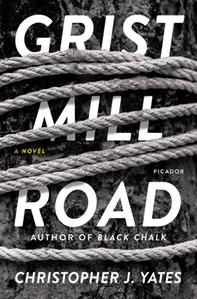
|
|
| photo: Circe | |
Christopher J. Yates was born in London and brought up mostly in Kent. He studied law at Wadham College, Oxford, and then vacillated between a career in law and working in puzzle magazines. After coming down on the side of the latter, he finally realized what he really wanted to do. Write. Black Chalk (2014) was his first novel; his second, Grist Mill Road, was just published by Picador. He lives in New York City with his wife, Margi, and his furiously hungry dog, Mabel.
After reading both of your novels, I can see that you are a master of the surprise, of playing with readers' minds. Did your work as a puzzle editor fine-tune this ability to be twisty (or twisted)?
Absolutely. I think of a plot as a puzzle I am setting for myself. When I started writing Grist Mill Road, I knew that a boy tied a girl to a tree and started shooting her with a BB gun, but I had no idea why. That was the puzzle. That's what kept me writing. I sat down and hoped each day would be the day when it came to me--why did this boy do this terrible thing? Or is he just a psychopath? I thought it would be more interesting if he wasn't a horrible psychopath, but I didn't know if that would be the case when I started writing. It actually took two years for Matthew's motive to jump into my head. I was getting quite worried. If I hadn't figured it out soon, then the novel would have been ruined. I didn't think a plain old psychopath was interesting. So I was starting to panic a little. That was a very exciting day! I solved my own puzzle.
Grist Mill Road has three narrators--Patrick (called Patch), Hannah and Matthew. Each has a distinct voice and manner. I wasn't expecting Hannah to be so funny, so wry. Was it difficult to write such distinct voices?
It was incredibly difficult, and referring to the last question, that was one of the puzzles I set for myself. Could I write three very different voices? Also, I lived in England until I was 34 years old and needed American voices. I thought I had set myself way too hard a challenge. But pushing yourself is good, being scared is good. When I finally heard these voices and got them down, they were the thing that kept me going every day.  Patrick's cooking is lovingly described--"the potatoes are perfect as well, first a quick smack of salt and then the crisp shell shattering down into light pillowy flesh." Are you a cook?
Patrick's cooking is lovingly described--"the potatoes are perfect as well, first a quick smack of salt and then the crisp shell shattering down into light pillowy flesh." Are you a cook?
I am, and I used my experience of both cooking and learning to cook in writing the character of Patch. There's a section where you find out why he started cooking--his parents divorced and his mother has to go out to work, and she can't cook for her sons anymore, so she leaves them TV dinners. This was the same reason I started to cook. My parents divorced, and my sister and I were left to microwave meals. I decided I didn't like microwaved spaghetti Bolognese every night, so the answer was to learn to cook. And I've been cooking since I was 14.
Geology and cement, as well as food, are integral parts of the novel.
I'm a really keen hiker. The novel is set in a fictional place called the Swangums, which is based on a real place in upstate New York--Shawangunks. That's a word I thought would trip the reader up, so I changed it. It has some of the best rock climbing in the world and I'm fascinated by the rocks up there, so wanted to learn the geology.
As for cement, the town of Roseborn is based on two or three towns in the area. One of them is Rosendale, so my Roseborn cement is based on Rosendale cement. Again, it's just something I found interesting--how the cement was used to build the Brooklyn Bridge and parts of Grand Central Terminal. I liked the idea of nerdy interests, so often ascribed to men, being transferred to Hannah.
Are you working on another book?
I'm trying, yeah. There's a lot going on right now with promoting Grist Mill Road, but I do have 15,000 words and hopefully I can get back to working on that soon. --Marilyn Dahl

